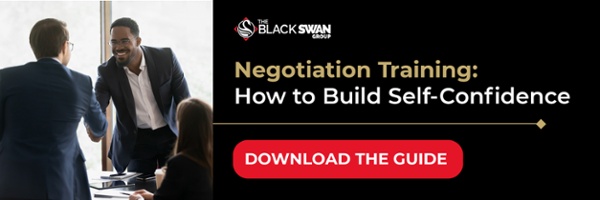According to the dictionary, self-confidence is “confidence in oneself and in one’s powers and abilities.” But in negotiation, self-confidence is much more than just belief in one’s own power.
It’s a change of attitude from “I can’t…” to “I can…” Self-confidence is that inner voice telling us that we’re capable of achieving our goals. It’s the ever-present “I can do this” even while our own abilities are still growing. It’s a mindset shift.
The Dali Lama, spiritual leader of Tibet, wisely offered, "With realization of one's own potential and self-confidence in one's ability, one can build a better world."
Let’s look at why self-confidence is so vital in negotiations—and how to grow it using the Black Swan skills.
Don’t kill it before it grows—When you lack self-confidence
Self-confidence is key in negotiations, because it puts us in the best position to be successful. It’s not about feeling superior to others, it just means we know we’re prepared and can push through and persevere. We might experience setbacks, but those are temporary. It’s self-awareness more than anything else.
A lack of self-confidence can lead to a bad negotiation. It can make us worry about making mistakes and overthink decisions, leading us to spiral and fill ourselves with self-doubt.
Because of this, we become timid. We don’t push ourselves to achieve our goals for fear of failure. We’re so caught up in our negative thinking that we often start believing what’s not actually true.
For example, most of us have experienced walking into a room full of people and suddenly worried about the things others might be thinking about us. In reality, most people are already too caught up worrying about their own issues to think about you.
If you really want to start seeing results, it’s time to get out of your head. That self-doubt is subtle at first, but it’s ultimately poison. It will leak into your system as a permanent insecurity and will prevent you from reaching your potential.
Use C.A.V.I.AA.R. to boost your confidence
We teach a course at the Black Swan Group called “C.A.V.I.AA.R.” And while we use it to demonstrate how to respond in certain dynamics and situations, nearly every portion of it applies to self-confidence.
Curiosity – When you’re attacked, rather than letting it have a negative impact on you, consider the “why” behind the person's behavior. There’s always a driving force behind their acts. Sometimes it’s even caused by their own lack of self-confidence.
Accept – At some point, you (or your proposal, stance, etc), will be attacked. Your counterpart may attack your proposal as an act of intimidation or to cause you stress. Regardless of their reason, accept that an attack is likely to occur.
Vent – To help minimize our negative emotions, vent about the upcoming negotiation with a close friend. Discussing it ahead of time not only allows you to reduce your negative emotions, it also helps increase your confidence levels.
Identify – It’s important to recognize your counterpart’s negotiation personality before engaging with them. This will help you determine their motives and drives, and which negotiation skills work better on them than others.
Accusation Audit – Preemptively addressing the negatives of the situation has a tremendous positive impact on our counterpart. It also demonstrates you have the courage to bring up difficult issues. Your willingness to dive headfirst into the conflict breeds confidence.
Remember – Keep in mind your counterpart is not the adversary, the situation is. Your confidence to ‘stay in your seat’ and deal with the situation head-on will also help your counterpart see your desire to work with them, and not against. Negotiation doesn’t mean one wins and another loses. Done properly, both parties can walk away as winners.
Confidence is about mindset
As a final reminder of the importance of self-confidence, consider what Christopher Robbins quotes to Winnie the Pooh, “Always remember, you're braver than you believe, and stronger than you seem, and smarter than you think.”
Confidence ultimately starts with your mindset. All it takes is a single shift in thought in the right direction.


